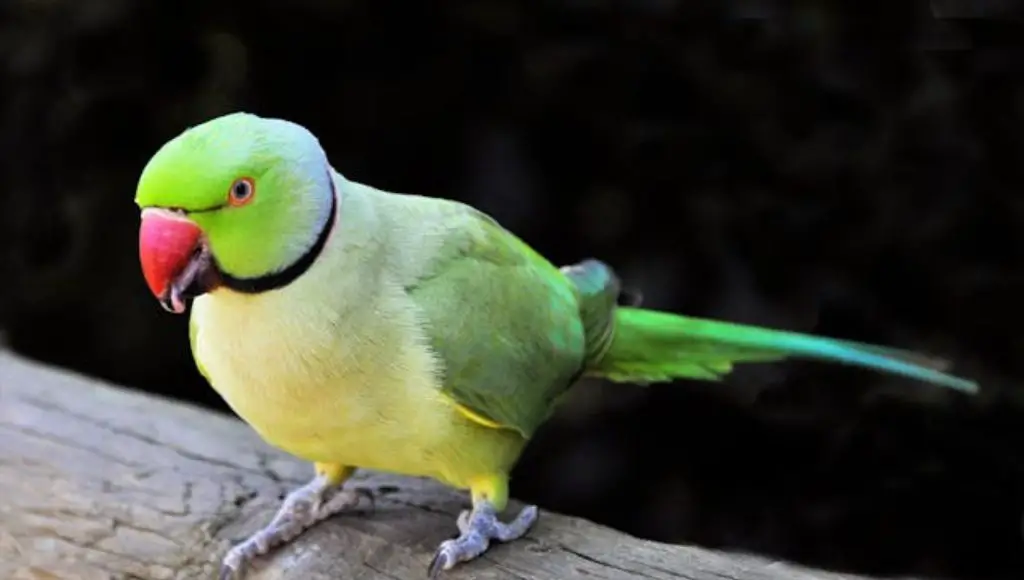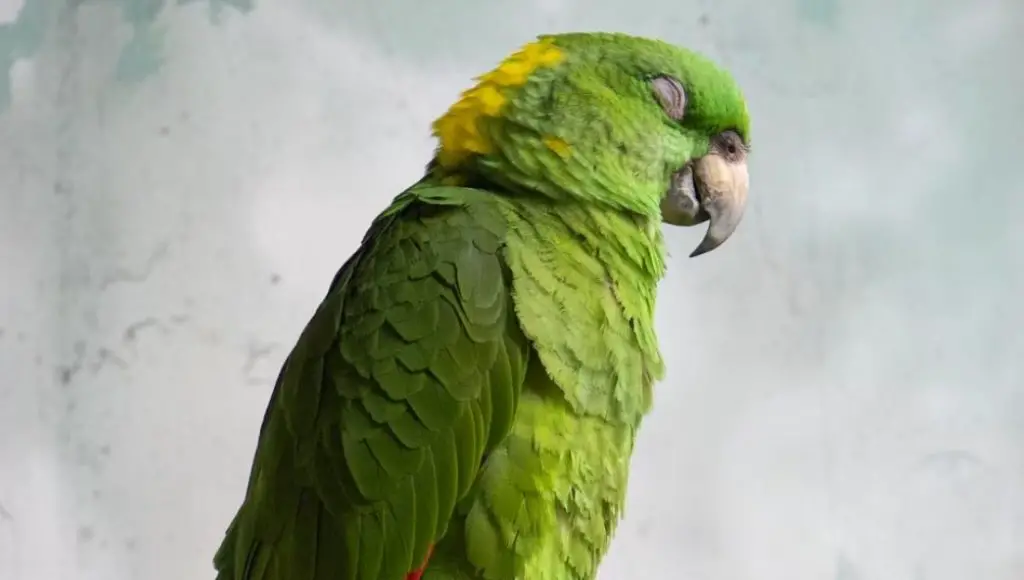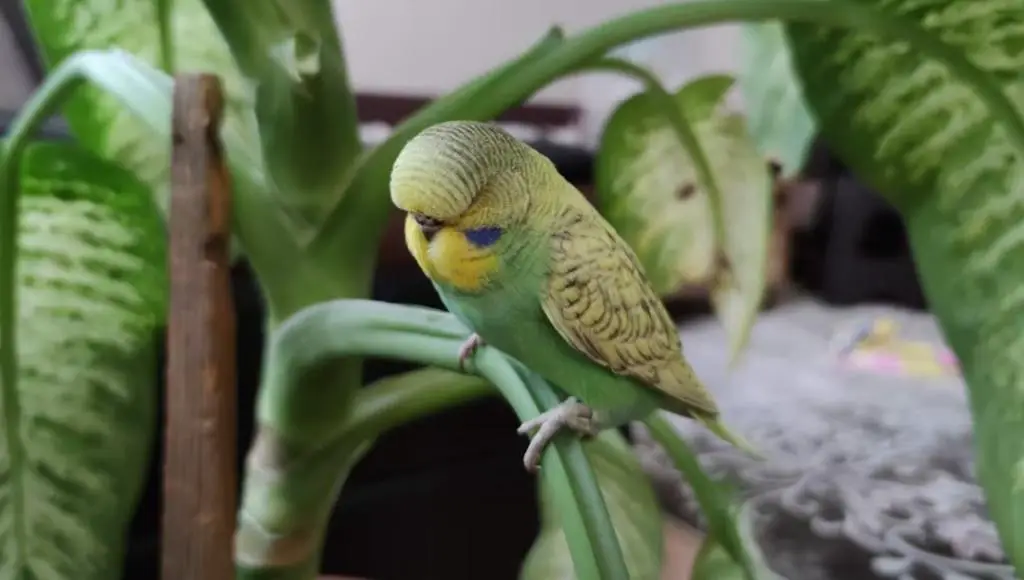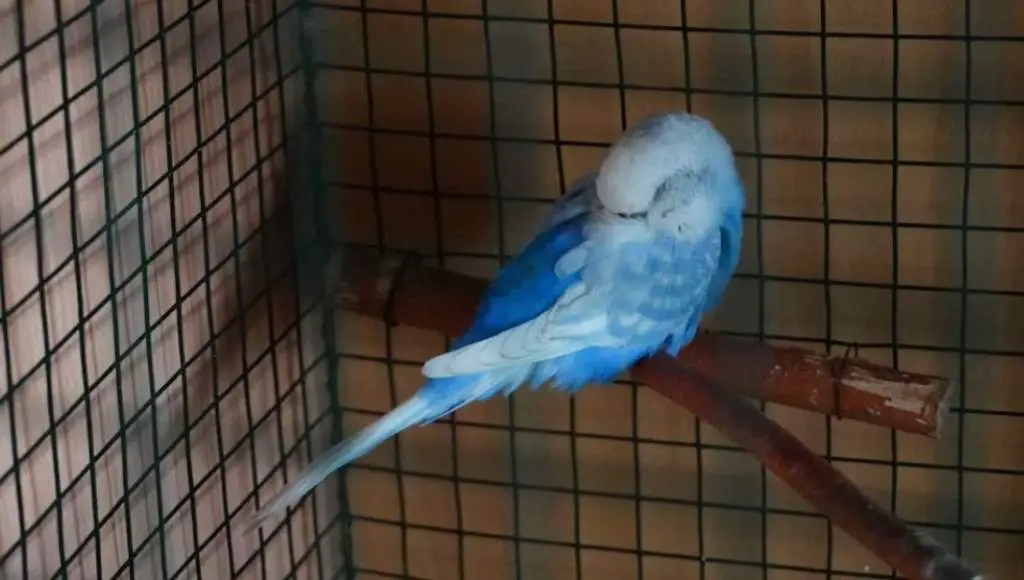12 Potential Sick Parrot Symptoms

Whether you’re a proud parrot parent or simply curious about your feathered friends, it’s crucial to be aware of the signs when your colorful companion isn’t feeling their best.
In this quick read, we’ll dive into the telltale sick parrot symptoms, so you can spot them early, take action, and ensure your feathered buddy gets back to their chirpy self in no time.
Let’s feather our knowledge and keep our parrots happy and healthy together!
Sick Parrot Symptoms
Sick parrot symptoms can vary, but some common signs to look out for include loss of appetite, sneezing, coughing, diarrhea, and feather plucking.
If you notice any of these symptoms, it’s important to seek veterinary care to ensure your parrot receives the necessary treatment and care.
Let’s break it down further…
Here are some of the most common sick parrot symptoms:
1. Change in eating habits
One of the telltale signs that something might be up with your feathered friend is a change in their eating habits.
If your parrot suddenly loses interest in their favorite treats or starts eating significantly less, it could indicate that they’re not feeling well.
It’s essential to keep an eye out for any changes in appetite as it may be an early warning sign of an underlying health issue.
2. Sudden or significant weight loss
Weight loss in parrots can be a cause for concern.
If you notice that your parrot is dropping weight rapidly or experiencing a significant decrease in body size, it’s crucial to seek veterinary attention promptly.
Weight loss can be a symptom of various illnesses, including infections, metabolic disorders, or even psychological issues.
A vet will be able to conduct a thorough examination and suggest the necessary steps to address the problem.
3. Changes in droppings
Paying attention to your parrot’s droppings can provide valuable insights into their overall health.
Any significant changes in color, consistency, or frequency might indicate an issue.
For example, if the droppings become watery or have a foul odor, it could be a sign of gastrointestinal distress or infection.
Similarly, if the droppings are discolored or contain blood, it’s essential to consult a vet right away.
Regular monitoring of your parrot’s droppings can help you detect potential problems early on.
4. Fluffed feathers
Parrots typically have sleek and glossy feathers. However, if you notice that your parrot’s feathers suddenly appear fluffed or ruffled, it could be a sign of illness.
Fluffed feathers can be an indication of discomfort, pain, or a drop in body temperature.
It’s crucial to monitor your parrot closely if you notice this symptom and seek veterinary advice promptly.
The vet can evaluate the parrot’s overall condition and determine the underlying cause.
5. Breathing difficulties

When it comes to breathing difficulties in a parrot, it’s essential to pay close attention.
If you notice your feathered friend having trouble breathing, it could be a sign of a respiratory issue.
Keep an eye out for labored breathing, wheezing, or open-mouthed breathing.
If your parrot seems to be struggling in these areas, it’s crucial to seek veterinary attention promptly.
6. Sneezing or nasal discharge
Parrots, like humans, can experience sneezing or nasal discharge from time to time.
However, if you notice an excessive amount of sneezing or a persistent nasal discharge, it could indicate an underlying problem.
Such symptoms might suggest an infection or an allergy.
It would be wise to monitor your parrot closely and consult a veterinarian if you observe these signs.
7. Behavioral changes
Parrots are known for their vibrant personalities, so any noticeable behavioral changes might be cause for concern.
If your parrot is suddenly withdrawn, lethargic, or less interactive than usual, it could be an indication of illness.
Other behavioral changes to watch out for include excessive aggression, feather plucking, or a lack of appetite.
These changes may warrant a visit to the vet to determine the underlying cause and provide appropriate care.
8. Vomiting or regurgitation
Vomiting or regurgitation in parrots can be a bit complicated to distinguish.
Regurgitation is a natural behavior for parrots, especially during courtship or as a sign of affection.
However, if you observe frequent vomiting or regurgitation that seems excessive or abnormal, it could be a sign of an underlying health issue.
Persistent vomiting can lead to dehydration and other complications, so it’s vital to consult a veterinarian promptly for a proper diagnosis and treatment.
9. Changes in vocalization
Parrots are known for their lively and chatty nature, so if you notice any changes in your parrot’s vocalization, it could be a sign that something is amiss.
Keep an ear out for unusual sounds, such as excessive squawking, silence when they normally vocalize, or a change in the pitch or tone of their usual calls.
These variations might indicate that your feathered friend is feeling under the weather.
10. Change in water consumption
Paying attention to your parrot’s water consumption is crucial when assessing their health.
If you observe a sudden increase or decrease in their water intake, it could be an indication of an underlying issue.
Excessive thirst might suggest a problem like a kidney disease or diabetes, while a decrease in water consumption could be a sign of dehydration or anorexia.
Monitoring their water dish can provide valuable insights into their well-being.
11. Visible injury or abnormalities
Take some time to carefully inspect your parrot for any visible injuries or abnormalities.
Look for signs like wounds, bleeding, swelling, or lumps on their body.
Additionally, keep an eye out for any changes in their feathers, such as loss of feathers, scruffy appearance, or changes in coloration.
These physical changes can be indicative of an injury, infection, or even a parasite infestation, and should be addressed by a veterinarian promptly.
12. Lethargy
Parrots are generally active and energetic creatures.
If you notice a significant decrease in your parrot’s activity level, such as prolonged periods of inactivity, sleeping more than usual, or a lack of interest in their surroundings, it could be a sign of lethargy.
Lethargy is a nonspecific symptom that can be caused by various underlying health issues, including infections, nutritional deficiencies, or organ problems.
It’s important to monitor your parrot’s behavior and consult with an avian veterinarian if you have concerns.
What to do if you found out your parrot is sick

The first thing you should do is stay calm and assess the situation.
Look for any obvious signs of illness, such as changes in behavior, appetite, or physical appearance.
It’s important to contact an avian veterinarian as soon as possible. They are trained to diagnose and treat bird illnesses.
While waiting for the appointment, make sure your parrot is comfortable with a warm and quiet environment.
Keep an eye on their food and water intake and provide fresh, nutritious options.
Remember, it’s crucial not to self-diagnose or administer any medications without professional guidance.
The vet will guide you on the best course of action to help your feathered friend recover.
How to take care of a sick parrot

When caring for a sick parrot, it’s important to provide a calm and comfortable environment.
Keep the cage clean and well-ventilated, and maintain a consistent temperature between 65-85°F (18-29°C).
Offer fresh water and a balanced diet of fruits, vegetables, and high-quality pellets or seeds, tailored to your parrot’s species.
Provide a quiet and stress-free space with minimal disruptions, allowing your parrot to rest and recover.
Monitor its behavior and appetite closely, and consult a avian veterinarian if you notice any concerning symptoms or changes.
Lastly, give your parrot plenty of love and attention, as positive interactions can help boost its spirits and aid in the healing process.
Learn more about birds dying of old age.
FAQs
What are some common signs that my parrot may be sick?
Look out for signs such as loss of appetite, lethargy, changes in droppings (color, consistency), abnormal feather appearance, sneezing or coughing, and unusual behavior like excessive aggression or excessive sleepiness.
My parrot is making strange noises. Is this a sign of illness?
It depends on the type of noise. Parrots can make various sounds, but if you notice wheezing, raspy breathing, or any unusual sounds that seem out of the ordinary, it’s best to consult a veterinarian to rule out any underlying health issues.
Can stress or environmental factors cause sickness in parrots?
Yes, stress and environmental factors can have a significant impact on a parrot’s health. Changes in their surroundings, exposure to toxins, temperature fluctuations, or lack of mental stimulation can weaken their immune system and make them more susceptible to illnesses.
Is it normal for my parrot to regurgitate its food?
Parrots may regurgitate as a natural behavior, especially during courtship or bonding rituals. However, if your parrot is regurgitating excessively or without any apparent reason, it could be a sign of illness, and you should seek veterinary advice.
What should I do if I suspect my parrot is sick?
If you notice any concerning symptoms or changes in your parrot’s behavior, it’s important to consult an avian veterinarian as soon as possible. They have the expertise to diagnose and treat avian illnesses effectively.
How can I prevent my parrot from getting sick?
Maintaining a clean and hygienic environment for your parrot is essential. Regularly clean their cage, provide a balanced diet, offer plenty of fresh water, ensure proper ventilation, and minimize exposure to potential hazards or stressors. Regular veterinary check-ups are also crucial for early detection and prevention of illnesses.
Conclusion
In conclusion, if you notice any of these sick parrot symptoms in your feathered friend, it’s crucial to act swiftly. Remember to monitor their behavior, consult a veterinarian, and provide the necessary care and attention they need. With your love and proper medical intervention, your parrot will be on the road to recovery in no time!
